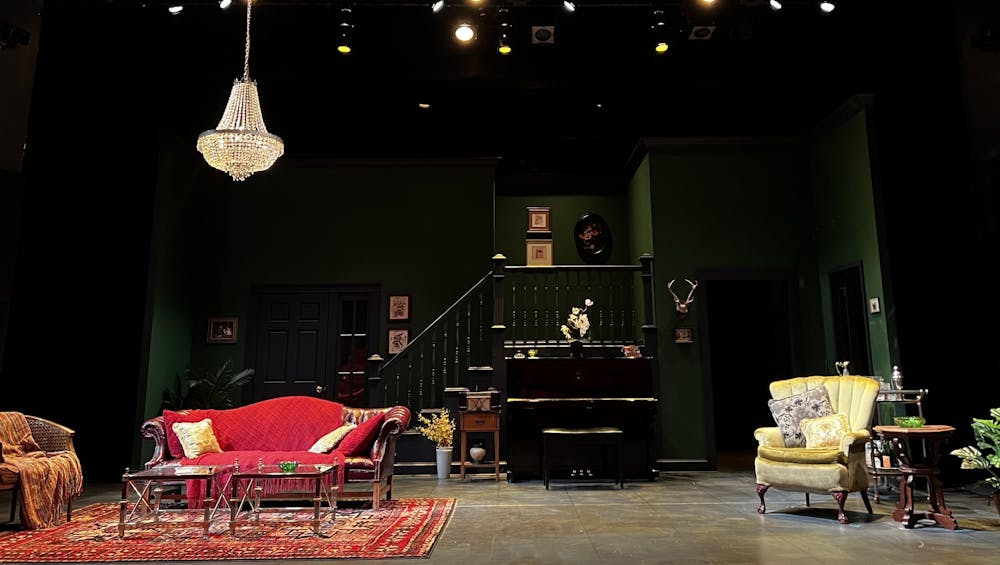“My husband married me to have a constant reminder of how loathsome women are.”
This was the opening line of the subtly feminist play, “Fefu and Her Friends,” which the AU Department of the Performing Arts presented on March 24 through 26. A nuanced performance full of chemistry, female friendship, internal conflict and hilarity, the production of this drama-comedy directed by Nadia Guevara struck a reflective and influential chord.
The show, written by María Irene Fornés, is split into three acts and takes place over the course of one spring day at a New England home in 1935. The show begins by introducing Fefu (Zoe Babbit), a housewife who is hosting seven of her other friends at her home for an undescribed event being held later.
As the women arrive – Cindy (Sedona Salb), Christina (Cate Ginsberg), Julia (Danielle Cohen), Paula (Sirra Faal), Sue (Grace Perry), Emma (Ava Markhovsky) and Cecilia (Ava Wilson) – a whirlwind of chaotic events transpire. Fefu uses a rifle to shoot blanks at her off-stage husband, Christina sucks on bourbon-made ice cubes to deal with Fefu-induced anxiety, and Emma regales the women with her expensive outfit and fancy costume.
Throughout these actions, it becomes clear that each woman is in a different phase of learning to reject her femininity or embrace it. All grapple with some level of internalized misogyny — some struggle more than others to associate words with their feelings.
Such themes are present through the words, actions and even costumes of each woman. Fefu wears a beautiful suit-set and tie and laughs off her dysfunctional relationship, but still acknowledges in a lengthy soliloquy that men have power and “natural strength” while women do not. Along with Christina, she buys into the idea that women cannot trust or get along with each other.
The second act was set up in a non-traditional structure that also allowed for a more detailed and personal experience. The audience was divided into four groups and taken by docents to different “rooms” in Fefu’s home. These four scenes were performed simultaneously and repeated until each of the four groups had been taken to all sections of the stage and watched all four scenes. The segments cover seemingly random conversation topics from genitals and croquet in the garden to in-depth dream reflection and reading French in the study.
Each actor contributed a phenomenal performance that allowed the audience to intimately feel the weight of the separate conversations. The thoughtful pauses in conversation contributed to a natural flow, making the interactions more believable. The impactful scenes continue to show the support and love between women that defies the patriarchal ideal that surrounded them in the 1930s.
Moreover, the scenes in the rooms also explore the theme of symbolic hunting and how that is reflected in what a woman experienced when facing societal expectations. One clear example of this is seen in Julia’s dream where she exclaims that “judges” found her and violently attacked her because she refused to be “good and quiet” about her allegedly being shot in a hunting accident.
The third and final act of the play is fast-paced, touching on the topics of privilege and wealth. There was one strange scene where the women participate in a fight over who should wash the dishes, taking their maturity as fully realized adults and destroying it temporarily.
This segment could either be interpreted as empowering because the women felt comfortable enough to break out of these “perfect” roles, or as insulting by infantilizing them as young girls. And surprisingly, the play ends shortly after — very suddenly and unexpectedly — while bringing full circle a gut-wrenching and tearful goodbye.
Overall, the costume and set design were impeccable and reminiscent of upper-class 1930s society, even down to the upper-class Mid-Atlantic accent . The talent and impact of hidden messages cannot be overstated. Guevara wrote in the show program that she wanted “to create something that spoke to the feminine experience before the vocabulary to explain the experience was able to be widely defined.”
Without a doubt she delivers, allowing audiences to identify with and relate to the real and present issues faced by Fefu and her friends.





